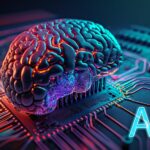Artificial Intelligence (AI) is no longer a futuristic concept—it has firmly established itself as a groundbreaking force that is reshaping industries across the globe. One area where AI is making profound advancements is in healthcare. AI is transforming medical diagnostics, patient care, drug development, and even healthcare management. By automating tasks, improving accuracy, and enabling better decision-making, AI has the potential to save lives and improve the quality of healthcare for people worldwide.
In this article, we will explore how AI is improving healthcare, its various applications, and how it can save lives by increasing efficiency, reducing human error, and enabling more personalized treatment. Additionally, we will discuss the potential challenges and ethical considerations surrounding AI in healthcare, and look into future trends that could further enhance medical care.
AI in Medical Diagnostics: Improving Accuracy and Speed
One of the most significant contributions of AI to healthcare is its ability to enhance diagnostic accuracy. Diagnostic errors are a leading cause of preventable harm in healthcare systems worldwide, with studies suggesting that up to 10% of patients in hospitals receive a misdiagnosis. AI-powered tools, such as deep learning algorithms, are revolutionizing how healthcare professionals detect and diagnose medical conditions, making them more precise, faster, and less prone to human error.
AI can analyze vast amounts of medical data, including medical imaging, test results, and patient records, to identify patterns and anomalies that might go unnoticed by human doctors. For example, AI algorithms used in radiology can quickly and accurately identify signs of tumors, fractures, and other abnormalities in X-rays, MRIs, and CT scans. Studies have shown that AI models can outperform radiologists in detecting breast cancer, lung cancer, and even brain tumors with higher accuracy and fewer false positives and negatives.
Moreover, AI is making significant strides in diagnosing diseases that are challenging to detect early, such as Alzheimer’s disease. AI tools that analyze speech patterns, brain scans, and genetic information are showing promise in identifying early markers of dementia, allowing for early intervention and better management of the disease.
AI in Personalized Medicine: Tailored Treatments for Better Outcomes
Personalized medicine, also known as precision medicine, is an approach to healthcare that takes into account individual differences in patients’ genes, environments, and lifestyles. AI is playing a pivotal role in advancing this field by analyzing complex biological data and making it possible to develop customized treatment plans for individual patients.
For instance, AI can help identify genetic mutations that may increase the risk of certain diseases, allowing doctors to design treatment plans that are tailored to the unique genetic makeup of the patient. In oncology, AI-driven platforms are helping oncologists analyze genetic data from tumors and predict which treatment options will be most effective for individual patients. By considering genetic variations and other factors, these AI systems can help doctors select the best drug or therapy, minimizing trial-and-error approaches and reducing the risk of adverse side effects.
AI can also assist in monitoring chronic conditions like diabetes, heart disease, and asthma. Wearable devices powered by AI can track vital signs such as heart rate, blood glucose levels, and oxygen saturation, providing real-time data to healthcare providers. AI algorithms can analyze this data to detect early warning signs of a health crisis, such as a heart attack or stroke, allowing for timely intervention and potentially saving lives.
AI in Drug Development: Accelerating Innovation
Developing new medications is a long, costly, and often uncertain process. It can take years for a drug to go from the lab to the market, with only a small percentage of candidates ever making it through clinical trials. AI is transforming the drug development process by speeding up the discovery of new therapies, optimizing clinical trial designs, and predicting how different drugs will interact with the human body.
AI models can analyze large datasets of molecular structures, patient outcomes, and disease pathways to identify potential drug candidates more efficiently. For example, AI-powered platforms such as IBM Watson for Drug Discovery can sift through massive amounts of scientific literature, clinical trial data, and medical records to identify promising compounds that might not be immediately obvious to human researchers. This has the potential to drastically reduce the time and cost required to develop new drugs.
In addition, AI is improving clinical trials by identifying patients who are most likely to benefit from specific treatments. By using AI to analyze patient data, researchers can design more effective trials, select appropriate participants, and ensure that trials are completed more quickly and efficiently.
The COVID-19 pandemic has accelerated the use of AI in drug development, particularly in the race for vaccines and treatments. AI models were used to rapidly analyze the virus’s genome and identify potential drug candidates, leading to faster vaccine development and more efficient treatments.
AI in Healthcare Management: Streamlining Operations
In addition to improving clinical aspects of healthcare, AI is also transforming how healthcare systems are managed. Healthcare providers are under constant pressure to improve efficiency, reduce costs, and provide better services. AI-driven solutions are helping organizations optimize operations, automate administrative tasks, and reduce human error in decision-making.
AI can be used for predictive analytics, which can help hospitals and clinics predict patient admission rates, identify bottlenecks, and allocate resources more efficiently. For example, AI algorithms can forecast the number of patients likely to require urgent care based on historical data, seasonal trends, and other factors. This allows hospitals to adjust staffing levels, streamline patient flow, and prevent overcrowding in emergency rooms.
Additionally, AI is automating many administrative tasks in healthcare, such as billing, scheduling, and documentation. Chatbots and virtual assistants are being used to handle routine inquiries from patients, freeing up healthcare staff to focus on more critical tasks. AI-driven systems can also analyze large volumes of medical records and provide insights into patient care, helping doctors make more informed decisions and improving overall patient outcomes.
AI and Healthcare Accessibility: Expanding Reach to Underserved Communities
AI also has the potential to address disparities in healthcare access, especially in underserved communities and low-income regions. By providing affordable, AI-powered tools, healthcare services can be made available to people who may not have access to specialized care due to geographical or financial barriers.
For example, AI-powered telemedicine platforms enable patients to consult with doctors remotely, reducing the need for travel and making healthcare more accessible to people in rural areas. AI-driven diagnostic tools can also be used by healthcare workers with minimal training to perform complex tasks, such as interpreting medical images or analyzing lab results, in remote or underserved locations.
In addition, AI-powered mobile health applications are helping individuals manage their health more effectively, offering personalized health tips, reminders for medication, and even mental health support. These tools make it easier for people to take control of their health, reduce the burden on healthcare systems, and improve health outcomes.
Challenges and Ethical Considerations of AI in Healthcare
While the potential of AI in healthcare is vast, there are several challenges and ethical concerns that need to be addressed. One of the main concerns is data privacy and security. Healthcare data is highly sensitive, and any breach could have severe consequences for patients. Ensuring that AI systems comply with data protection regulations, such as HIPAA in the U.S., is essential to maintaining trust and ensuring the ethical use of AI in healthcare.
Another challenge is the need for transparency in AI decision-making. AI algorithms are often described as “black boxes,” meaning that their decision-making processes are not always easily understood by humans. In healthcare, where lives are at stake, it is essential that AI systems provide clear, explainable, and accountable recommendations to healthcare professionals.
Moreover, the widespread adoption of AI could exacerbate health inequalities if not implemented thoughtfully. There is a risk that AI solutions could primarily benefit wealthier nations or urban centers, leaving rural and underserved populations without access to the latest technologies.
Conclusion
AI has the potential to revolutionize healthcare by improving diagnostics, enabling personalized treatment, accelerating drug development, and enhancing healthcare management. It can save lives by providing faster, more accurate diagnoses, helping doctors choose the right treatment plans, and enabling early detection of life-threatening conditions. As AI continues to evolve, it will empower healthcare providers to offer more efficient, accessible, and affordable care to patients worldwide.
However, to fully realize the benefits of AI in healthcare, we must address the challenges surrounding data privacy, transparency, and equity. By doing so, we can ensure that AI-driven healthcare solutions are used responsibly, ethically, and for the greater good of society.
FAQs
- What are the primary benefits of AI in healthcare? AI improves diagnostic accuracy, enables personalized treatments, accelerates drug development, and enhances healthcare management efficiency.
- Can AI replace doctors in healthcare? AI is not meant to replace doctors but to assist them by providing better data analysis, predictions, and insights to improve decision-making.
- How does AI improve patient outcomes? AI enables faster and more accurate diagnoses, personalized treatments, and early detection of conditions, leading to better patient outcomes.
- Is AI safe for use in healthcare? When implemented correctly and with robust data security measures, AI can be safe and highly effective in healthcare.
- How does AI help in drug discovery? AI analyzes large datasets to identify promising drug candidates, predict patient responses, and optimize clinical trials, speeding up drug development.
- What ethical concerns exist with AI in healthcare? Ethical concerns include data privacy, the transparency of AI decision-making, and ensuring equitable access to AI technologies.
- How can AI improve healthcare accessibility? AI can make healthcare more accessible by enabling telemedicine, remote diagnostics, and personalized health management, especially in underserved areas.
Key Takeaways
- AI is revolutionizing healthcare by improving diagnostic accuracy, personalizing treatments, and speeding up drug development.
- AI can save lives by enabling early detection of diseases and offering personalized care based on genetic and environmental factors.
- While AI offers significant benefits, it is crucial to address challenges such as data privacy, transparency, and equitable access to ensure ethical and responsible use.
- The future of healthcare lies in harnessing AI’s potential to enhance care quality, reduce costs, and make healthcare more accessible to all.




